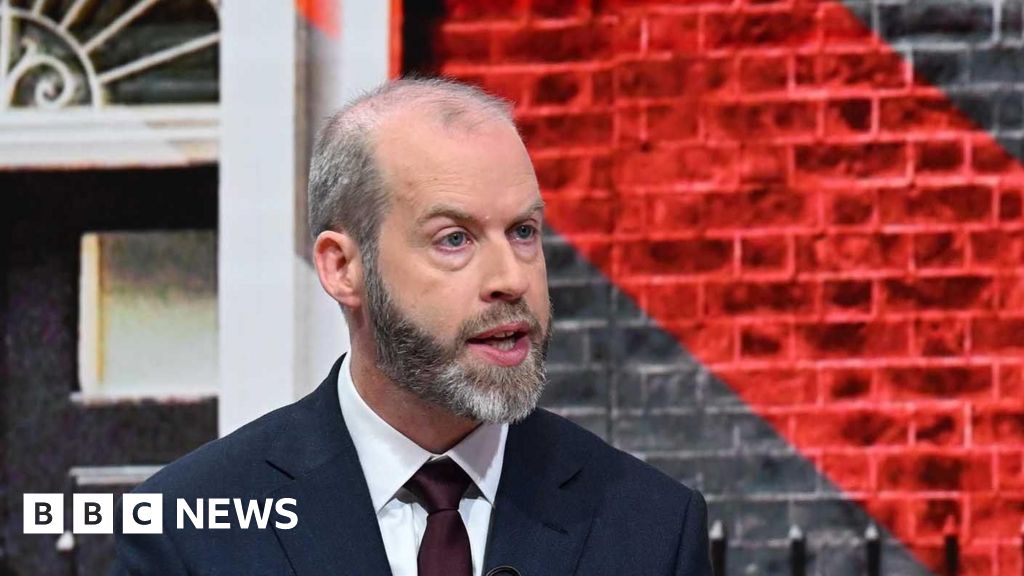- Author, Huw Thomas
- Role, Business correspondent, BBC Wales News
The UK government’s new business secretary has said “job guarantees” will form part of the negotiations with steel giant Tata about its Port Talbot site.
Jonathan Reynolds said there was “a better deal available” on the future of the plant, but said newer technologies would employ fewer people.
Mr Reynolds said he and Prime Minister Sir Keir Starmer had already spoken to Tata and were involved in active negotiations over the Port Talbot plant’s future.
Pressed on whether that meant he could guarantee all jobs, he responded: “Blast furnaces employ more people than some of the newer technologies available.
“So there’s a range of things you have to understand but I absolutely agree with the point that we have to make sure that this is a transition which works for working people and that they’re part of that.”
Mr Reynolds said the timescale for the government’s negotiations was “not a large one”.
He said Labour’s manifesto had pledged £2.5bn on top of the £500m already agreed by the former government.
“It’s not about underwriting loss making businesses in perhaps the way we might have thought of industrial policy in the past. It is about being a partner for investment in the future,” he said.
“There is more money available for the steel industry under our plans for government, but that’s about making sure we make this transition with the private sector together and recognise how we have to make sure that decarbonisation is not de-industrialisation and we’ve got to do that together.
“But there is a better deal available for Port Talbot and the steel industry as a whole – I’m sure of that.”
Port Talbot residents had mixed views of the latest developments.
Rachel White lives near the steelworks, but does not think it has a long-term future.
“I know a lot of people who work there who were obviously really concerned in the first place when they found out they were going to lose their jobs, but they’ve gone on to find better jobs for the next generation but the steelworks is never going to be a long-term solution,” she said.
“I understand they need to find the money for the people who do need the jobs but I feel like a bit more effort could be made in future-proofing for when it does eventually have to go.
“It’s good for the people who haven’t found anything else. I just think they could do a bit more work on what are the other options.
“We live really close to the steelworks and most people would complain about how dirty it is and the effect it has on the environment and on people’s houses.
Nigel Hunt, who runs a clothing shop in the town, thought the minister’s comments did not go far enough.
“I think it’s going to be empty words frankly,” he said. “I think what they need to do is nationalise a foundation manufacturing industry, an industry that makes world-class steel.
“It makes huge quantities of it and it sells because there is a huge demand for it because there is still a manufacturing industry. The automotive industry, aerospace, tin plate and defence, they’re all Port Talbot steel.
“What’s going to happen to that manufacturing base if this industry goes?”
Before he retired Donald Gwyne-Cooke was a steelworks employee, but he believes steelmaking’s time in the town is over.
“I’d prefer it closed down myself because of the pollution. I don’t like to see people losing their jobs but there are other jobs.”
Chris David said: “It’s the only infrastructure in this town and people rely on it. This has been going on for a number of years now and it’s the backbone of this town and without it it’s going to be difficult for everyone.
“The government says a lot of things, but whether they’ll act on it is another thing.
“They’ve got to show commitment, otherwise nobody’s going to believe them. This new government coming now, hopefully they’ll do something about it and back the people of Port Talbot because they’re hard working and they need some support.”
Glimmer of hope
The idea of future investment offers a glimmer of hope for those who are seeking to mitigate the impact of Tata’s plans.
Labour had discussed supporting future investment in Port Talbot during the general election campaign, and Tata bosses had been open to the idea.
But future investment will not save jobs in the short term. Even Tata Steel’s existing commitment to building an electric arc furnace next year will require far fewer workers than are currently employed in the heavy end of blast furnace production.
Unite union general secretary Sharon Graham said the steel industry had been decimated.
She said it needed investment, job guarantees and procurement legislation that “all UK infrastructure projects should use UK steel”.
“We need to back British steel, we need to back British business – investment is going to be key,” she told the BBC.
Tata Steel UK head Rajesh Nair said he was looking forward to working with the UK government on growing green steel production.
“We will be engaging with new ministers over our ambitious plans to invest in and transform Port Talbot with electric arc furnace steelmaking, and to support our workers through this necessary but difficult transition,” he said earlier this week.
Image source, Getty Images
The company said the blast furnace operation was incurring losses of £1m a day and was financially unsustainable.
Tata has been in talks with unions since January when it unveiled plans to radically transform its operations to deal with its financial losses and cut carbon emissions.
Are you affected by issues covered in this story?

Robert Johnson is a UK-based business writer specializing in finance and entrepreneurship. With an eye for market trends and a keen interest in the corporate world, he offers readers valuable insights into business developments.








